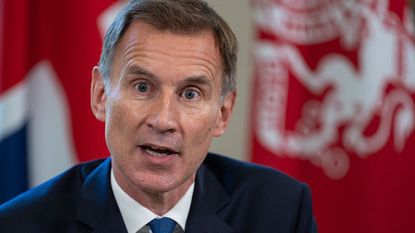Autumn Statement: Energy Price Guarantee extended – but will not be as generous
Hunt will extend the Energy Price Guarantee, which was due to end in April 2023. But, the support will be significantly lower. Here’s everything you need to know.


The Energy Price Guarantee (EPG) will be extended, announced chancellor Jeremy Hunt in his Autumn Statement - but the typical average household will still see their energy bill rise to an estimated £3,000 starting April 2023.
The EPG was introduced by Liz Truss and Kwasi Kwarteng to help households with rising energy bills in the September mini-Budget. Under the EPG, the average typical household was expected to pay £2,500 in bills as opposed to the predicted £3,549 a year from 1 October.
This was due to be the case until October 2024, however Hunt reduced this to April 2023 due to the cost it would have to the government. Hunt said looking beyond April, it would be “irresponsible for the government to continue exposing the public finances to unlimited volatility in international gas prices”.
Subscribe to MoneyWeek
Subscribe to MoneyWeek today and get your first six magazine issues absolutely FREE

Sign up to Money Morning
Don't miss the latest investment and personal finances news, market analysis, plus money-saving tips with our free twice-daily newsletter
Don't miss the latest investment and personal finances news, market analysis, plus money-saving tips with our free twice-daily newsletter
Today’s announcement is not a price cap – your bill will depend on how much energy you actually use. The price that energy firms charge per unit of energy will be capped, but it’s still increasing.
What will happen to energy prices after April 2023?
Analysts had predicted bills would rise to £3,700 from April 2023 without government interference. The £3,000 average bill prediction is lower, but it’s still a marked increase from what you pay now.
“The new energy price cap of £3,000 for a typical household is 20% more than people are currently paying, and two and a half times where energy bills were last summer, when the typical energy bill was around £1,200,” says Sarah Pennells, consumer finance specialist at Royal London.
Whether wholesale gas prices will go down remains to be seen, as these have been driven up in part by Russia’s invasion of Ukraine. However, there have been forecasts suggesting energy bills could hit as much as £6,000 a year, based on average typical use, in 2023.
With so much complexity in the markets, it can be difficult to predict which direction gas prices will go.
Will I still get the £400 energy grant?
The £400 energy grant, announced by the former chancellor Rishi Sunak will still be paid to all households on the energy grid. But, this will come to and end in March, meaning the actual hike to your energy bill will be higher.
The first of these payments started in October and will end in March. See our article on who will get the £400 energy grant and how it will be paid.
Kalpana is an award-winning journalist with extensive experience in financial journalism. She is also the author of Invest Now: The Simple Guide to Boosting Your Finances (Heligo) and children's money book Get to Know Money (DK Books).
Her work includes writing for a number of media outlets, from national papers, magazines to books.
She has written for national papers and well-known women’s lifestyle and luxury titles. She was finance editor for Cosmopolitan, Good Housekeeping, Red and Prima.
She started her career at the Financial Times group, covering pensions and investments.
As a money expert, Kalpana is a regular guest on TV and radio – appearances include BBC One’s Morning Live, ITV’s Eat Well, Save Well, Sky News and more. She was also the resident money expert for the BBC Money 101 podcast .
Kalpana writes a monthly money column for Ideal Home and a weekly one for Woman magazine, alongside a monthly 'Ask Kalpana' column for Woman magazine.
Kalpana also often speaks at events. She is passionate about helping people be better with their money; her particular passion is to educate more people about getting started with investing the right way and promoting financial education.
-
-
 Investment trust discounts hit 2008 levels. Here’s how to profit
Investment trust discounts hit 2008 levels. Here’s how to profitInvestment trust discounts have risen to levels not seen since 2008, here are three trusts looking to buy to profit.
By Rupert Hargreaves Published
-
 A luxury stock to buy at a high street price
A luxury stock to buy at a high street priceInvestors wrongly consider Watches of Switzerland a high-street outlet.
By Dr Matthew Partridge Published
-
 August NS&I Premium Bond winners unveiled - have you scooped £1m?
August NS&I Premium Bond winners unveiled - have you scooped £1m?Two lucky NS&I Premium Bond winners are now millionaires in the August draw. Find out here if you are one of them
By Tom Higgins Published
-
 Savings rates more than double in a year as challenger banks top the best buy tables
Savings rates more than double in a year as challenger banks top the best buy tablesThe best savings rates have doubled - and in some cases tripled - in a year, with challenger banks offering the highest rates. While they are still no match for inflation, we look at what you could be earning.
By Ruth Emery Published
-
 Midlife MOT: what is it and who can get one?
Midlife MOT: what is it and who can get one?The government has launched an online midlife MOT to help older workers with financial planning, health guidance and career skills. But how does it work, who can get one and would you pass it?
By Ruth Emery Published
-
 Coventry Building Society launches new best easy access savings account
Coventry Building Society launches new best easy access savings accountCoventry Building Society's deal tops our easy access savings account list, but could your cash be put to better use?
By Tom Higgins Published
-
 NS&I boosts fixed-term savings rates
NS&I boosts fixed-term savings ratesThe NS&I, the government-backed savings institution has mirrored recent rate rises seen elsewhere in the market.
By Tom Higgins Published
-
 Should you let AI give you financial advice?
Should you let AI give you financial advice?Can AI fill the financial advice gap? Kalpana Fitzpatrick looks at the pros and cons of using AI to guide your finances.
By Kalpana Fitzpatrick Published
-
 Small pension pots to be consolidated, says DWP
Small pension pots to be consolidated, says DWPWorkplace pension schemes worth less than £1,000 that become “deferred” when a saver changes jobs will be consolidated under a new system
By Ruth Emery Published
-
 Watchdog summons banks to explain paltry savings rates
Watchdog summons banks to explain paltry savings ratesSavings rates trail mortgage rates - and the financial watchdog has summoned banks to a meeting amid concerns of profiteering.
By Katie Binns Last updated









